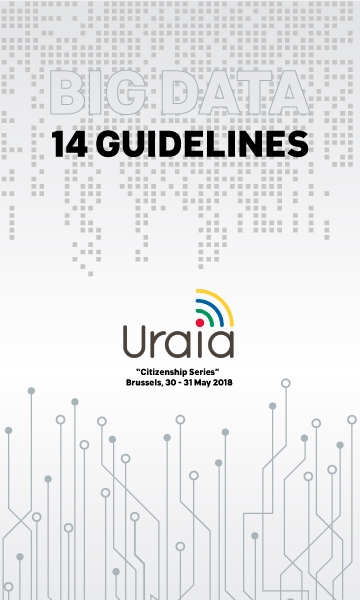In May 2108, Uraia, the portal for exchanges between smart cities, organised a workshop in Brussels focused on the theme “Using data to empower cities and their citizens”. The conclusions drawn from the workshop are brought together in 14 recommendations for fully taking advantage of data’s potential in smart cities.
Over two days, participants at the Brussels Uraia workshop exchanged their thoughts and experiences regarding data’s contribution to managing smart cities, especially to the benefit of citizens.
The content of their discussions is currently collected in the report titled “Recommendations from Brussels 2018: Using data to empower cities and their citizens.” The report establishes that, despite practical examples demonstrating big data’s contributions to urban management, numerous barriers still prevent their widespread adoption. It therefore presents fourteen recommendations to lift these barriers and fully exploit the potential of data.
The fourteen recommendations from Brussels
-
Raise awareness of local authorities to better understand the opportunities data can bring them and to its citizens
- Training and deploying new administrative human resources
- Training and awareness should also focus citizens
- Cities must learn how to collect and understand data
- Tapping opportunities requires good quality understandable and standardized data
- Data as a public policy evaluation and monitoring tool
- Monitoring the impact of the use data
- A good data policy is a governance issue
- A good data policy requires political leadership at all levels
- Cities should push for and facilitate strong multi-stakeholder partnership arrangements
- No one should be left behind!
- Creating and developing new business models
- Good data management means better leadership and better engagement
- Cities should co-develop simplified participative processes and tools
Seven Open Data and Big Data use case-studies
Smart cities are developing on five continents. The report finds that their level of maturity is such that municipalities are seeking to analyse the costs and benefits of implemented policies, as well as their economic impact.
The report draws on seven case-studies:
- The Open Data strategy of the Brussels-Capital Region (Belgium)
- Chicago’s (USA) experience with collaborative urban renewal policies
- Seoul’s (South Korea) Big Data initiatives
- The smart waste bin project in La Marsa (Tunisia)
- Data’s contributions to innovation and education in Sao Paulo (Brazil)
- The reach of participatory policies implemented by the Valongo municipality (Portugal)
- Use of the Internet of Things (IoT) in Eindhoven (the Netherlands)
A workshop organised by BRIC and Brussels International
The Uraia workshop on “Using data to empower cities and their citizens” was organised by the Brussels-Capital Region and the
Brussels Regional Informatics Centre, in collaboration with
Brussels International. It brought together close to 70 representatives from local administrations, national governments, international organisations, research institutes and the private sector.
Uraia (“citizenship” in Swahili”) is a platform for exchanges about the possibilities SMART technologies offer for innovation in local public management. The platform was created in 2014 as a place for discussions between local governments and their partners. It’s the result of the collaboration between two international institutions which work to improve the quality of life of urban citizens around the world: the Global Fund for Cities Development (FMDV) and UN-Habitat’s Local Government and Decentralization Unit.
